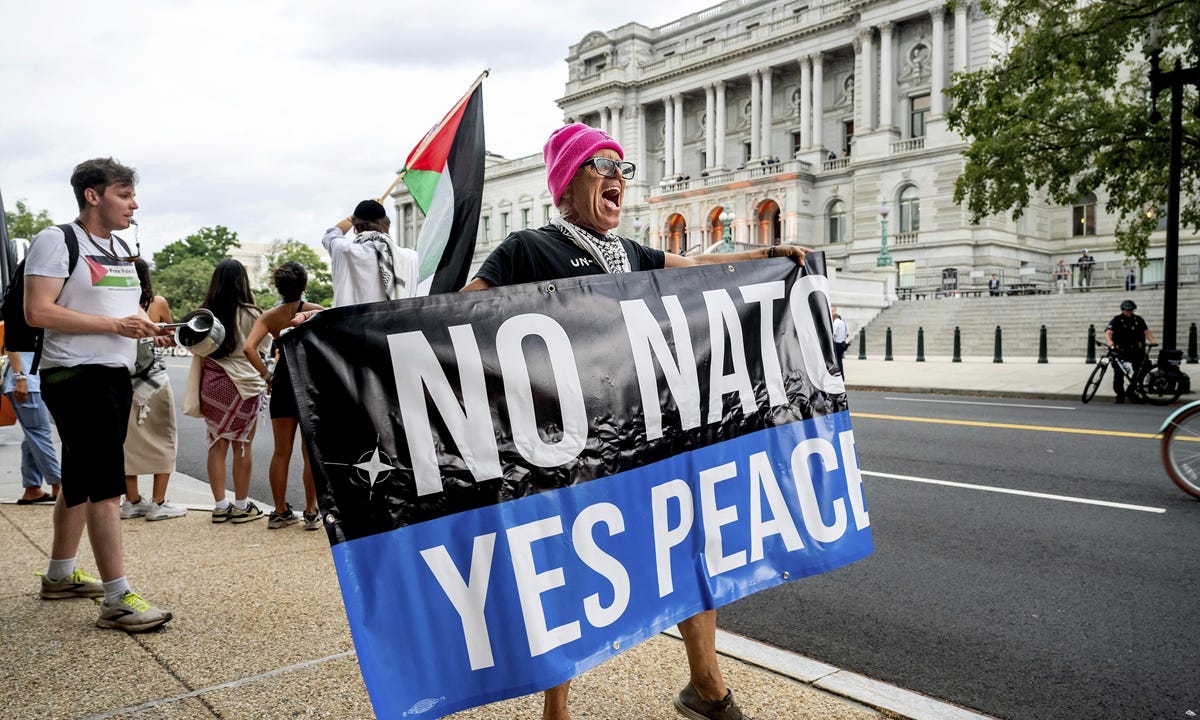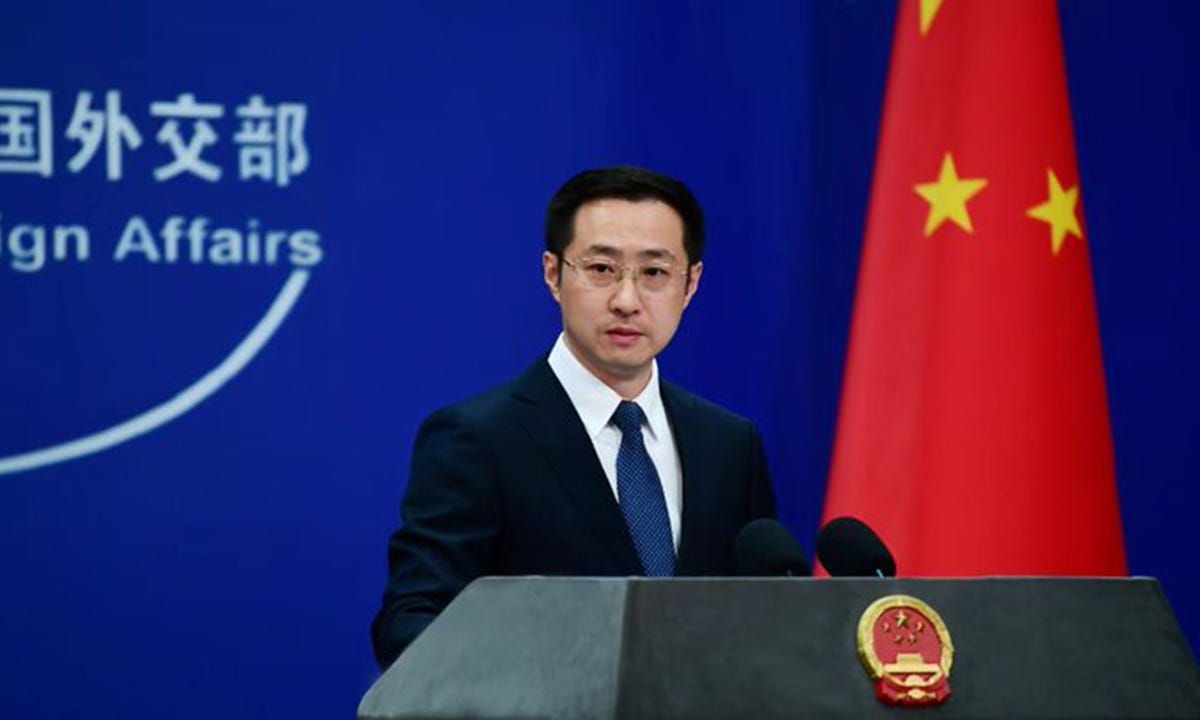The Washington Summit of the North Atlantic Treaty Organization (NATO) issued a Declaration on July 10, 2024. The Declaration displays a myopic view of NATO’s mission, far from “the dialogue of civilizations” that is being convoked by the leaders of the Global South and East. It identifies five villains on the world scene, namely Russia, China, Iran, Belarus, and the Democratic People’s Republic of Korea. It proclaims its commitment to the defense of the territory of the member states of the Alliance, based on the shared values of individual liberty, human rights, and democracy. Here it affirms the perceived right of the world powers of the North to politicize the issue of human rights and to interfere in the internal politics of nations developing political systems approaching people’s democracy and that insist upon their sovereignty.
The Declaration interprets Ukraine as a nation that is heroically defending its land and its values. It declares that “Russia bears sole responsibility for its war of aggression against Ukraine.” It makes no effort to critically engage an alternative interpretation emerging from many leaders and analysts in the Global East and South, which refers to the territorial expansion of NATO to the borders of Russia, the Western interference in Ukraine to establish a government that would support Western interests, the fascist oppression of said government of the Russian population in Ukraine, the Western unwillingness to implement the Minsk agreement negotiated with the participation and support of Russia, and questions concerning the legitimation of the current government of Ukraine.
The Declaration makes clear its long-term military support for the government of Ukraine, including the establishment of the NATO Security Assistance and Training for Ukraine (NSATU); a Pledge of Long-Term Security Assistance for Ukraine; and the taking of steps toward the establishment of the NATO-Ukraine Joint Analysis, Training, and Education Centre (JATEC). It declares its intention to fully integrate Ukraine in the Euro-Atlantic alliance. Here it can be noted that this strategy of long-term military assistance to Ukraine is of economic benefit to the defense industries of the Western powers, as the Declaration itself notes. The Declaration, however, does not note that the permanent extension of the war comes with the price of the shedding of Ukrainian and Russian blood, but not the blood of the nations of the West.
The Declaration expresses NATO’s rejection of the expanding strategic partnership between Russia and the People’s Republic of China, and it sees the partnership as an attempt “to undercut and reshape the rules-based international order.” Here the Declaration is not entirely off target. The Chinese-Russian partnership does indeed seek the construction of an alternative to the current Western-centered world order, established by the Western powers with minimal consultation or dialogue with the nations of the Global South and East. Russia and China pursue the project of alternative world construction in cooperation with states in all regions of the world, based in their common understanding that the established world order imposes structural obstacles on the economic and social development of the nations of the world. Russia and China see themselves, and are seen by others throughout the world, as seeking to defend their sovereignty and develop their economies. There is in this no violation of international law, only a refusal to submit to terms dictated by the West.
The Washington Declaration of NATO stressed the need for expanding military expenditures, including nuclear and conventional weapons as well as missile defense capabilities, so that the NATO defense system can be modernized and prepared to respond to any threat to any of the members of the Alliance. The Declaration called for all member nations to fulfill their commitment to spend at least 2% of their GDP on defense. It declared that a “strengthened defence industry across Europe and North America . . . is a critical part of NATO’s deterrence and defence, . . . [and] . . . underpins Allies’ immediate and enduring support to Ukraine.” In addition, Ukraine serves as a laboratory for innovations in military technology, as is revealed in the observation that “we are closely monitoring technological advancements on the battlefield in Ukraine, and we are launching new innovation initiatives with our Ukrainian partners.”
This call for increased military expenditures is consistent with the interests of the defense industries of the United States and Europe. It goes against the persistent and long-standing call of the Global South for increased investment in the economic development of developing nations as the best guarantee of world peace, and it goes against their persistent advocacy of less spending on arms, especially nuclear arms.
In Articles 27-35 of the Declaration, NATO expresses its vision of world politics. It maintains that through expansion of its nuclear arsenal, the nations with advanced economies in the Global North would be militarily prepared for any threat posed by China and nations of the Global South and East. The Declaration asserts that the nations of the Alliance count on support from its partners, mentioning as its partners the non-NATO states of Europe plus Australia, Japan, New Zealand, the Republic of Korea, and the nations of NATO’s “southern neighborhood,” namely Egypt, Mauritania, Morocco, Tunisia, Jordan, Algeria, Qatar, Kuwait, United Arab Emirates, and Israel. It declares that the Indo-Pacific, the Western Balkans, and the Black Sea regions are of strategic importance for the security of the members of the Alliance.
NATO, therefore, proposes a project of Euro-Atlantic dominated security integration that would depend upon and would drive the expansion of the defense industries of the United States and Europe. It is a project that knows nothing of diverse civilizations and the various meanings of democracy, thus reinforcing the foundation for the politicization of human rights as a pretext for interference and intervention in the affairs of other nations. It is a project that does not hear the proposals of the Global South and East for construction of the common security of all on a foundation of cooperation and mutually beneficial trade among nations. It is a proposal that favors the interests of the defense industries as against the interests of manufacturing and service industries whose commerce flourishes in times of peace. It is a proposal that openly declares that the members of NATO have an economic interest in subverting all efforts toward peace.
Russian President Vladimir Putin recently has called upon the nations of Europe to go in a different direction. He maintains that today’s NATO project is not in the interests of Europe, because it provides structural incentives for military interventions, and because it promotes European economic and cultural dependency on the United States. Putin maintains that mutually beneficial trade among the nations of the vast Eurasian continent would promote common development and common security for all. With appreciation of the European leaders who have expressed the need for Europe to avoid subordination to an economic agenda driven by U.S. interests, Putin hopes for a new generation of leaders in Europe who would understand the need for European autonomous development as an economic and civilizational pole in a pluripolar world-system, with good relations of cooperation with Russia.
China responds to the NATO Washington Declaration
The Washington Declaration of NATO has harsh words for the People’s Republic of China as “a decisive enabler of Russia’s war against Ukraine through its so-called ‘no limits’ partnership and its large-scale support for Russia’s defence industrial base.” In a similar vein, it criticizes Belarus for permitting Russia to use its territory and infrastructure. And it criticizes the DPRK and Iran for fueling the Russian military operation through trade that supports the Russian military.
These comments provoked quick reaction from China. Chinese Foreign Ministry spokesperson Lin Jian said at a July 11 press conference that the NATO Washington Summit Declaration reflects a Cold War mentality that seeks the security of the West at the expense of the security of others. He noted that many of the security concerns of NATO are of its own making, and that NATO creates imaginary enemies to justify its existence and expand its power.
Li Haidong, a professor at the China Foreign Affairs University, told the Global Times that NATO is hyping the so-called “China threat” in order to justify increasing its presence in the world, especially the Asia-Pacific region. In the same vein, Chinese Foreign Ministry spokesperson Lin declared that "we firmly reject NATO's vilification and blame-shifting against China. NATO should not use China to justify its insertion into the Asia-Pacific and attempt to disrupt regional dynamics.” He further stated, "We urge NATO to form the right perception of China, get rid of its Cold War mentality and zero-sum approach, stop scaremongering on security and making imaginary enemies, stop forming exclusive clubs in the name of collective defense, and play a constructive role for global peace, stability and development."
A Global Times editorial of July 11 expressed the view that “NATO is the product of camp confrontation and group politics, and [it] stands in the opposite of the general global trend as well as the aspiration of the people. No matter how hard it tries to present itself as a ‘peacekeeping organization,’ it cannot hide its true nature as a ‘war machine.’” The editorial of the English-language Chinese newspaper further declared that “the so-called ‘success’ and ‘strength’ of NATO that the US and the bloc boast about today pose great danger to the world. All forces in the international community that love peace should remain vigilant against this dangerous trend. NATO's continued expansion in Europe and its reach into the Asia-Pacific region aim to infiltrate group politics and confrontational thinking into regional integration and economic globalization.”
The Global Times editorial further observed that the strengthening of NATO implies a cost for the wellbeing of the peoples of the world. If 2% of GDP of NATO member countries were to be directed toward aid for developing countries, world hunger and poverty could be ameliorated.
See a short video on the NATO Declaration by Chinese commentator Hu Xijin.
§
A free subscription option is available, with capacity to read, send, and share all posts. A paid subscription ($5 per month or $40 per year) enables you to make comments and to support the costs of the column; paid subscribers also receive a free PDF copy of my book on Cuba and the world-system. Ten percent of income generated through subscriptions to the column is donated to the Cuban Society for Philosophical Investigations.





